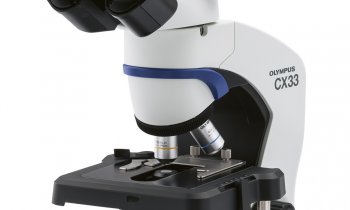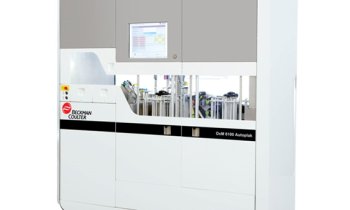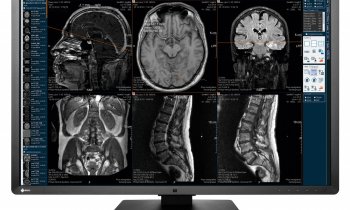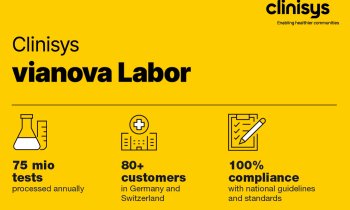Image source: University of Oxford; image credit: S. Booth
News • Increased infection risk
AMR: drug resistant bacteria can travel from gut to lung
A new Oxford University study released during World Antimicrobial Awareness Week has significant findings on how antimicrobial resistance (AMR) arises and persists.
The results, published in Nature Communications, provide the first direct evidence of AMR bacteria migrating from a patient’s gut microbiome to the lungs, increasing the risk of deadly infections. According to the research team, led by Oxford University’s Department of Biology, applying these findings could save lives, as it highlights the importance of preventing pathogenic bacteria from translocating from the gut to other organs where they can cause serious infections.
Recommended article

Article • Bacterial defense mechanism
Antibiotic resistance: a global threat to healthcare
Antimicrobial resistance (AMR) is becoming more prevalent around the world, constituting a serious threat to public health. When bacteria acquire resistance against antibiotics, common medical procedures – for example, in surgery – become impossible due to the high infection risk. Keep reading to find out about AMR research, development of new antibiotics and antibiotic alternatives.
The study was conducted on a patient that carried the bacterium Pseudomonas aeruginosa as part of their gut microbiome. This species is one of the leading causes of infections in hospitals, and one that is particularly good at resisting antibiotics. Whilst Pseudomonas is generally not considered to be dangerous when it is embedded in a healthy gut microbiome, it can cause serious infections in the lungs of hospitalized patients. During their stay in hospital, the patient was treated with the antibiotic Meropenem for a suspected urinary tract infection (UTI). Meropenem treatment caused non-resistant bacteria in the gut and lung to be killed off, and antibiotic resistant mutants of Pseudomonas were able to grow and proliferate. Pseudomonas was then found to translocate from the gut to the patient’s lungs during antibiotic treatment, where it evolved even higher levels of antibiotic resistance.
Our study shows how gut-lung translocation and antibiotic use can combine to drive the spread of AMR within a single patient
Craig MacLean
With AMR being an increasing concern in hospitals, preventing the spread of AMR bacteria to other vital organs such as the lung is critical in vulnerable patients. However, the origin of bacteria that cause these serious infections can be difficult to determine. This study shows how the gut microbiome can act as a reservoir of AMR pathogens that can translocate to the lung where they have the potential to cause life-threatening illnesses such as pneumonia. The findings of this study suggest that eliminating AMR pathogens from the gut microbiome of hospitalized patients could help to prevent serious infections, and it highlights how antibiotic use can have profound impacts on bacteria that are not actually the target of antibiotic treatment.
Researchers tested the patient throughout their time in hospital to track the duration of their infection with Pseudomonas. They used a genetic approach, creating a time-calibrated bacterial family tree that allowed them to analyse the progression and location of infection, besides its evolution. They also found high genetic diversity in the gut, which also suggests that the microbiome may be a reservoir for AMR to arise. Fortunately, the patient in this case had an immune response to the AMR bacteria in their lungs, preventing the infection from causing pneumonia. However, many people in critical conditions, particularly over winter, have a weakened immune system, meaning the body is less able to fight off disease. AMR policies often focus on reducing infection from external sources, but understanding how AMR can develop and spread within a patient is just as vital.
The researchers now intend to assess how frequently gut to lung bacterial translocation occurs in vulnerable patients by collecting samples from a much larger cohort. ‘Hospital acquired infections are one the biggest burdens of AMR. Our work shows that pathogenic bacteria from a patients’ own gut microbiome can disseminate to the lung, where they may cause difficult to treat infections. These findings underscore the importance of eliminating AMR bacteria from the gut microbiome of hospitalised patients, even when they are not causing infection,’ said Professor Craig MacLean (Department of Biology), lead author of the study. ‘There is a clear need to develop new approaches to the challenges that antimicrobial resistance presents. Our study shows how gut-lung translocation and antibiotic use can combine to drive the spread of AMR within a single patient. Insights such as this are needed in order to develop new interventions to prevent resistant infections. For example, our study highlights a potential benefit of eliminating AMR bacteria like Pseudomonas aeruginosa from the gut microbiome of hospitalized patients, even when these bacteria are not actually causing infection.’
Source: University of Oxford
22.11.2022











